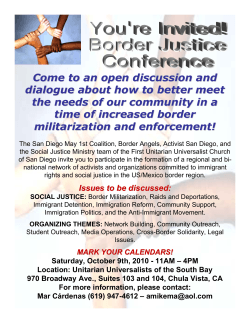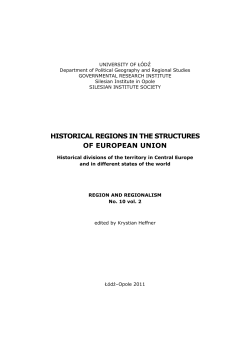
Dr. Charlie Thompson, leader of DukeEngage Tucson/Chiapas
Dr. Charlie Thompson, leader of DukeEngage Tucson/Chiapas discusses his new book, Border Odyssey, with Erin Leyson, Duke ‘15 How do you think most Duke students conceptualize the US/Mexico border? I think most Duke students are like the rest of America – they are unaware of what goes on the line south of Texas, Arizona, California and New Mexico. That southern line is probably the most misunderstood part of America. Yet at the same time, it says so much about us. I think of the border wall as the underlining of who we say we are. If we aren’t careful, it will begin to define us. To help counteract this, I believe Americans should try to understand the border. Before they make up their minds on immigration, they should get to know an immigrant. That’s why I started this project—so students can see the border, see the wall, and meet immigrants. There is no substitute for first-hand knowledge. How does your work with DukeEngage relate to your book, Border Odyssey: Travels Along the US/Mexico Divide? My border odyssey really started in the 1980s when I began working with farm workers in on my North Carolina farm. I entered graduate school with a strong commitment to understanding why people leave their lands in Latin America as well as deepening my understanding of our interrelationship with neighbors to the south. Later, after NAFTA passed in 1994, I became aware of mounting border deaths and the intensifying human rights abuses there. The border became ground zero for immigration debates long before I went there with Duke students, but the situation seemed to be worsening each year. When we started the DukeEngage program in 2007, students began traveling to Tucson and from there, to Mexico. Through those trips, our understanding of the border and our collective commitment to human rights advocacy deepened. Duke students returned to start the organization, Duke Students for Humane Borders. This year, 2015, marks the eighth year of our program. As I say in the acknowledgments of the book, without my experiences with DukeEngage, this book wouldn’t exist. Though the book is about my travels all along the entire border, it is also about my advocacy with farmworkers. The DukeEngage experience becomes a central part and the students are my interlocutors in several sections. They and the people we have worked with directly inspired me to write this book. Why do you care about the US/Mexico border and immigration issues? I care about human rights and I am appalled that we bring laborers from Latin America through the most perilous desert and through harrowing Rio Grande experiences to work in our fields and yet we vilify them. I know we can do better than that. After learning about so many deaths and so much mistreatment of workers, my trek along the entire border became a pilgrimage for understanding. When one goes there and sees it, the heat and the hate that come from the anti-immigrant forces in our country are palpable. Building the multi-billion dollar monstrosity says a lot more about us than those we fear. I lament our nation’s lost sense of humanitarianism and sense of justice. My concern stems from my hope that we can regain our commitment to welcoming the immigrants, that our symbol of the Statue of Liberty, rather than our border wall, could be our message to the world. What role should institutions of higher education play in issues of immigration? Higher education is about creating informed citizens who will go on to lead this nation. Being a good citizen necessitates exploration, debate, and the creation of new knowledge. In this nation of immigrants especially, our educational institutions have an obligation to study the border. Students who have gone on the DukeEngage trip with me have come back changed because they have seen it firsthand. Many have returned to work for better policies. Some have changed their career goals. Students write and share photos and their opinions can and do influence their families and audiences much beyond. That’s what I hope my book can do as well: for those who can’t go on a DukeEngage trip, this book is a virtual trip with me. A starred Kirkus Review calls Border Odyssey, “A potent cri de coeur for a more compassionate, sane and humane border policy.” Read the full Kirkus Review here Get the book at UT Press Visit the Border Odyssey Website for a map, photographs of the journey, and more.
© Copyright 2025



















